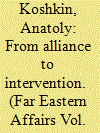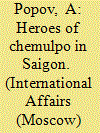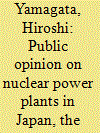| Srl | Item |
| 1 |
ID:
184787


|
|
|
|
|
| Summary/Abstract |
In 1940, the Indian population resident in Japan was estimated at over 500. With the potential for war with Japan increasing, the British embassy in Tokyo advised locally resident British subjects to leave in October 1940 and again in February 1941. However, some, including a number of Indians, chose not to leave. This article considers the evacuation of the Indian population from Japan before December 1941 as well as those who departed as part of the wartime Anglo-Japanese Civilian Exchange. In doing so, it discusses the use of the SS Anhui to evacuate British subjects and also the lack of safe conduct for the City of Paris, which carried the Indian repatriates back to Bombay.
|
|
|
|
|
|
|
|
|
|
|
|
|
|
|
|
| 2 |
ID:
089605


|
|
|
|
|
| Publication |
2009.
|
| Summary/Abstract |
The article examines the Russian-Japanese relations in the early 20th century from the Portsmouth Peace Treaty to the intervention of Japan in the Russian Far East. The interests of Russia and Japan in Korea, North China and in the fishing zone of the Sea of Japan and the Sea of Okhotsk are analyzed in detail. Coincidence and divergence of interests of the two sides on various problems in the region are revealed. The main stages of the Japanese intervention in the Far East and the rebuff to the Japanese troops by the regular and guerilla forces of the Far Eastern Republic are described.
|
|
|
|
|
|
|
|
|
|
|
|
|
|
|
|
| 3 |
ID:
189212


|
|
|
|
|
| Summary/Abstract |
ONE OF THE most legendary events in the history of the Russian Navy, the memories of which are still preserved by grateful descendants, took place in the first days of the Russo-Japanese War of 1904-1905.
|
|
|
|
|
|
|
|
|
|
|
|
|
|
|
|
| 4 |
ID:
192898


|
|
|
|
|
| Summary/Abstract |
Since Israel’s unilateral disengagement from the Gaza Strip in 2005 and the consequent seizure of power by Hamas, there has been an ongoing military confrontation between Israel and the Islamist terror organisation. Evacuation of civilians from Israeli border localities (known as the Gaza Envelope) during such confrontations has become a bone of contention between the local residents and the government as the security situation deteriorated and the danger to residents’ lives increased. Using 30 semi-structured in-depth interviews, this article examines the home-leaving experience of Gaza Envelope residents during the May 2021 Gaza War, with reference to interviewees’ mindsets, feelings, and behaviour at the time. Findings show a crisis of trust among those who left, primarily towards the state and its institutions, and secondly towards the social solidarity that used to be a cornerstone of Israeli society.
|
|
|
|
|
|
|
|
|
|
|
|
|
|
|
|
| 5 |
ID:
193727


|
|
|
|
|
| Summary/Abstract |
In attempts to solve climate change and energy security issues, many countries have made plans to invest in nuclear energy. Public opinion on nuclear energy is an important factor in building support for the construction and operation of new nuclear power plants (NPPs). In this study, public opinion surveys on existing NPP use and the new construction of NPPs were conducted simultaneously using the same method in Japan, the United Kingdom, and the United States of America. Japanese respondents were neutral on existing and new NPPs, citing “no strong reason”. In all three countries, the term “new construction” made the respondents anxious about NPP safety. This study also examined whether Japanese respondents’ attitudes change when the reasons for negative opinions toward NPPs are solved. By using the phrase “NPPs that no longer require evacuation,” respondent anxiety was resolved, and an increase in the respondents who agreed with the new construction of NPPs was observed. For Japanese respondents who believed that the problem of radioactive waste had not yet been resolved, the selection of a disposal site was not perceived as a solution. Based on these findings, this research provides valuable insights that can help advance energy policy in Japan.
|
|
|
|
|
|
|
|
|
|
|
|
|
|
|
|
| 6 |
ID:
152403


|
|
|